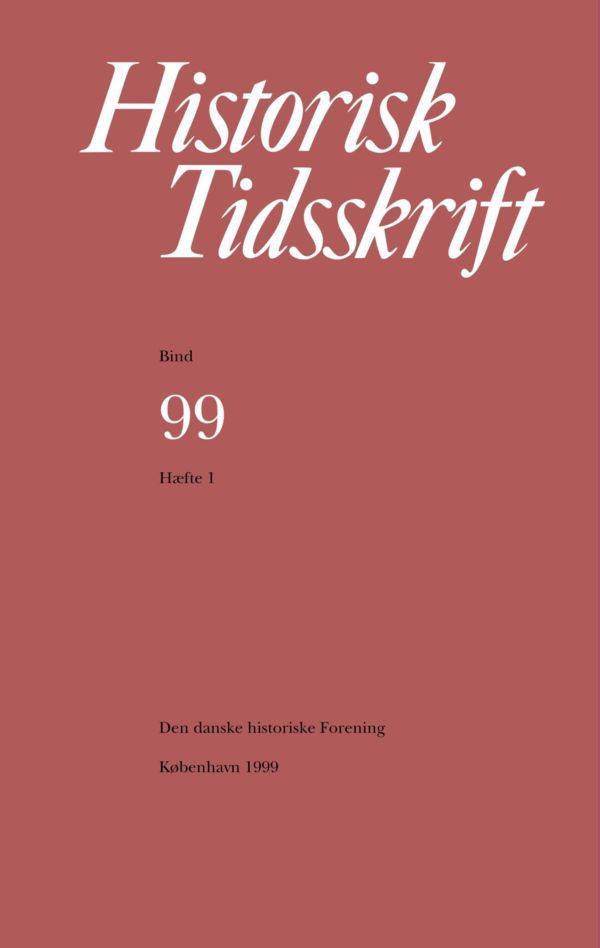Medborgerskabet fødes. Udvisningspraksis i Danmark 1875-1915
Resumé
The Expulsion of Aliens in Denmark 1875-1915On May 15 1875 the King of Denmark signed the Statute of Supervision of Aliens. In Parliament the bill had been subjected to extensive debate, particularly in the Upper House (Landstinget), where a large majority had stressed effective protection of the country against criminal elements, whether Danish or foreign. The politicians were prone to mention swindlers, thieves and especially Gypsies.The law provided for the expulsion of aliens whose presence in the Danish Kingdom was considered by the police to be undesirable for a number of given reasons. While the Penal Law of 1866 had already stipulated that aliens could be expelled after conviction and punishment for crimes committed in the country, the new law extended the grounds for expulsion to unemployment, lack of concrete means of subsistence for at least eight days, or inadequate personal identification. In such cases the local police authority was directed to implement expulsion. The remarkable feature of this legislation was that the police were given no discretionary powers, but were obliged to carry out expulsion upon ascertaining specified conditions.Between 1875 and 1915 more than 14,000 expulsions took place on the basis of the Statute of Supervision of Aliens and the Penal Law. These expulsions were reinforced by an injunction forbidding reentry into the country. Violation of the injunction was in itself an infringement of the law. None the less, numerous persons were expelled more than once, explaining why the actual number of persons involved during this period exceeded only somewhat more than 10,000. More than nine out of ten of them were expelled with an injunction on the basis of the law's general provisions, i.e. mainly because of unemployment.The circumstances of the expellees can be closely followed in the reports to the local police authorities from the head of the metropolitan police in Copenhagen. The three largest groups of expellees were Germans, Swedes and "Polacks," the latter especially after 1905. In four out of five cases they were men, which in turn may explain why there were twice as many skilled as nonskilled workers among them. It can also be shown that expulsion was mainly an urban phenomenon. As it turns out, the group that had particularly preoccupied politicians, the Gypsies, proved in practice to be a minimal problem: only two to three hundred of them at most were expelled with an injunction not to return.The fact that the alien supervision law was in reality used by the police to reduce unemployment apparently evoked little interest among politicians and the press. It is feasible to interpret the rather harsh Danish expulsion practice as the result of a tacit convergence of two related interests. On the one hand, the growing labour movement was in the process of defining itself in national terms and had little use for the presence of unemployed foreign workers with potential for depressing wages. On the other hand, as a rule the local police and municipal authorities were in practice combined, indeed the mayor and chief constable were almost always the same person. As head of the local police it was no doubt tempting for the mayor to expel unemployed aliens in order to reduce unemployment among the local Danish workers.The expulsion policy practised at that time was thus in full accord with the general trend to attach more importance than previously to nationality.Translated by Michael WolfeDownloads
Publiceret
Citation/Eksport
Nummer
Sektion
Licens
Ophavsret til bidrag i Historisk Tidsskrift tilhører forfatterne og Den danske historiske Forening som udgiver af Historisk Tidsskrift. For illustrationer gælder den ophavsret, som står anført i billedteksten. Ophavsretslovens almindelige bestemmelser gælder, hvilket vil sige, at ophavsretten gælder i 70 år efter forfatterens død. Bidrag i Historisk Tidsskrift må derfor, med forbehold for en ”moving wall” på tre år, frit downloades, læses, gemmes, anvendes og citeres (med kildeangivelse) i privat og videnskabelig sammenhæng, men de må ikke helt eller delvis genudgives af tredjepart, heller ikke i redigeret form, uden tilladelse fra forfatterne og Den danske historiske Forening. Henvendelse skal i så fald rettes til Historisk Tidsskrifts redaktion på histtid@hum.ku.dk.





